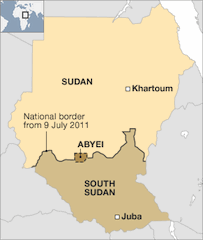S. Sudan rejects Sudan’s demands for 50:50 power sharing of Abyei council
January 13, 2012 (JUBA/KHARTOUM) – South Sudan on Sunday rejected a Sudanese demand seeking 50% of seats on the Joint Abyei Area Legislative Council (JAALC), as the two parties started talks in Addis Ababa on the formation of the administrative organs in the disputed area.

As directed by the two heads of state at the last summit, the Abyei Joint Oversight Committee (AJOC) met in the Ethiopian, Addis Ababa on Sunday to share names of the officials they wish to appoint to the administration and to finalise other issues.
Luka Biong Deng, South Sudan’s Co-Chair on the AJOC said the two sides agreed to form the joint interim administration. He, however, added they could not proceed with formation of the Abyei parliament after Sudan introduced a new demand, seeking equal membership in the area council.
“We have met and held discussions during which we exchanged names of officials to be in the joint interim administration in Abyei. This is to comply with the directives of the two heads of state in the last which directs Abyei Joint Oversight Committee to meet and form Abyei area administration, the council and police service”, he said.
However, he pointed out that they failed to form the local legislative body because “Sudan has come up with new demand. They want 50% membership in the council which is contrary to the previous arrangement”, Deng told Sudan Tribune by phone from Addis Ababa, Ethiopia on Sunday.
In accordance with the provisions of Abyei Protocol 40% of the council seats would be allocated to Sudan and 60% to South Sudan.
On the other hand Al-Khair Al-Fahim, AJOC co-chair from the Sudanese side confirmed that they asked to increase the number of seats allocated to Khartoum government.
He however did not elaborate on the reason for such demand stressing the need for a joint willingness to advance in the formation of local institutions.
The disagreement over the participation of Misseriya nomads in a referendum on the fate of the disputed region led to postpone a the crucial vote which had to take place in January 2011.
Deng said the new proposal on the Abyei Administration shows clearly that: “The government of Sudan is not interested in resolving the final status of Abyei. This can now be seen in this new proposal. With such mindset, they are just wasting time and resources.”

Mbeki, who heads the African Union High-Level Implementation Panel (AUHIP) on Sudan and South Sudan, suggested that a binding referendum takes place in October without the participation of Misseriya not living in Abyei.
This has been accepted by South Sudan, but rejected by Khartoum, as the indigenous Dinka Ngok would be expected to vote for Abyei to be transferred into South Sudan, from where it was moved by the British in 1905.
“Because we could not reach an understanding, we decided that we leave it to the lead negotiators”, Biong said.
Previous understandings on the council, he said, gives South Sudan 12 seats in the and eight seats to Sudan, from which 4 seats would be given to the Dinka Ngok members of Sudan’s governing National Congress Party in the area.
(ST)
